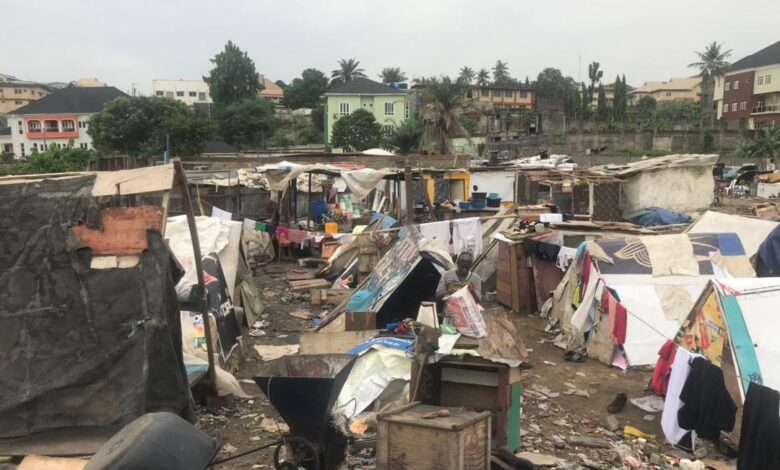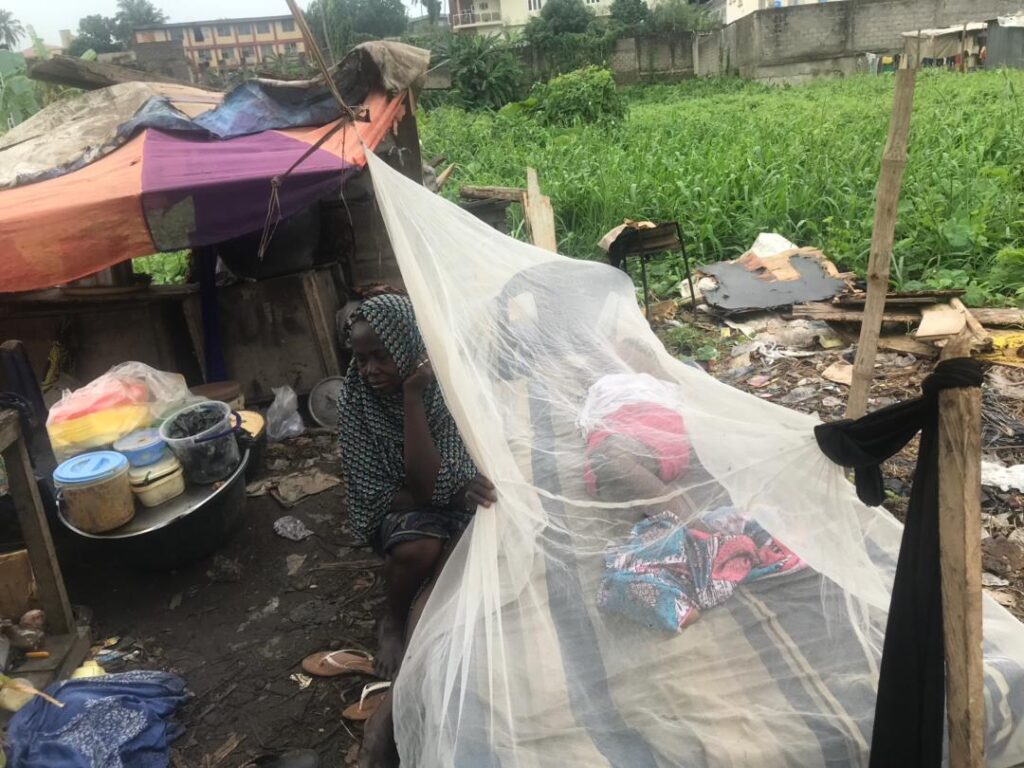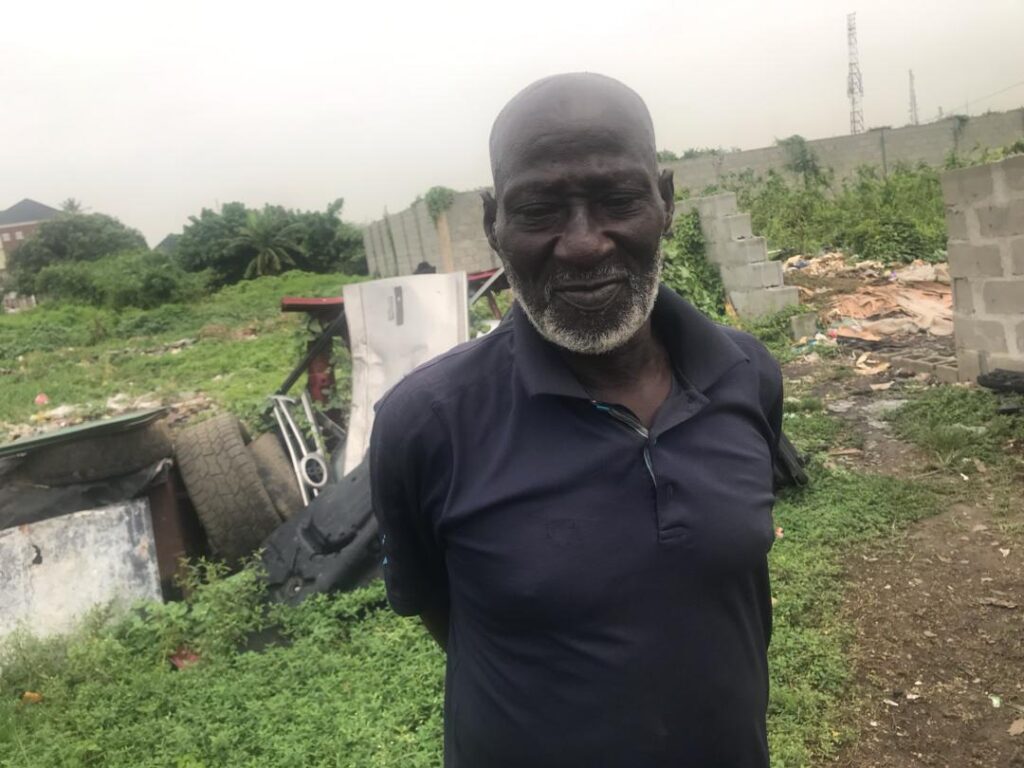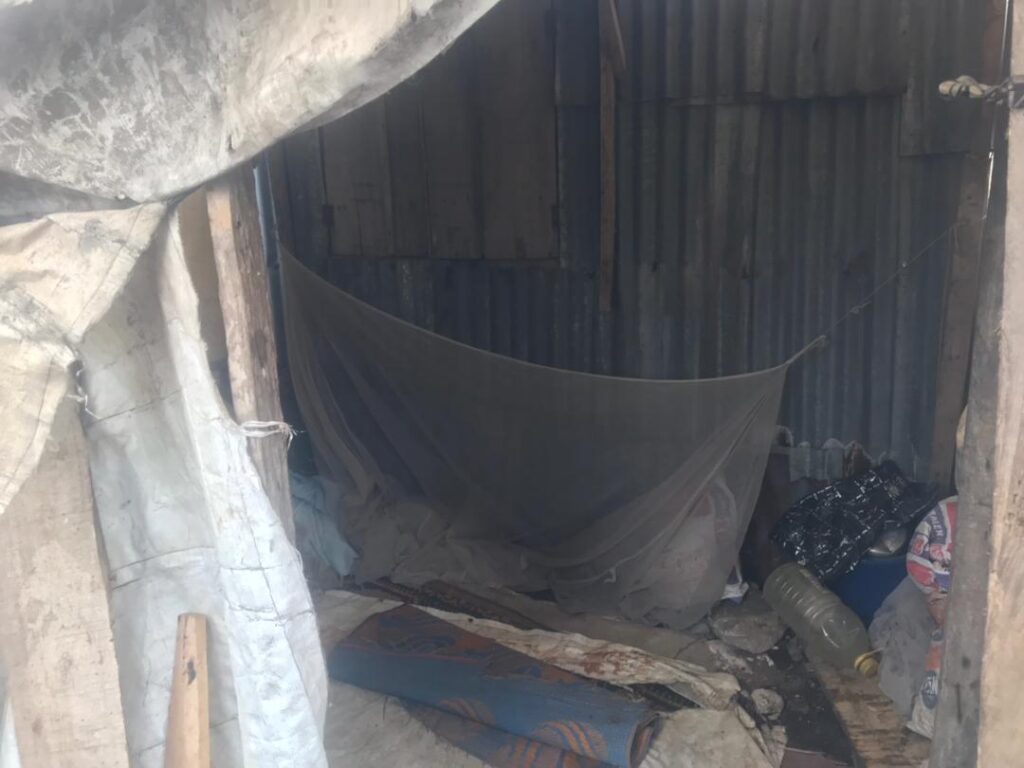Displaced And Neglected (1): Lagos’ Monkey Village Evictees Have Nowhere Else To Go
Their homes were demolished. Now the residents of Monkey Village in Lagos, Southwest Nigeria, live in the open without any kind of government support.

The air around Odeniran slum in Lagos State, Southwest Nigeria, is dominated by a stinking smell from a mountainous refuse dump within the community.
Located near the Opebi link bridge in the state’s Ikeja axis, since the state government’s demolition of Monkey Village in Dec. 2021, residents migrated a few meters away and formed a tiny community near the waste heap. People erected shanties and others established enterprises where they prepare and sell various delicacies.
A section of the community, on the other hand, looks like it is wrecked by a hurricane. Shrouded in mosquito nets, some people sleep outside while others remain in their shacks.

Lying on a mattress in the open, a woman popularly referred to as Iya Kudi shields herself from the cold. At her side is her daughter and some of her wares. Trying to conceal her tears, Kudi says “in all things, let’s give glory to God.”
But it appears like there is little to thank God for; Iya Kudi has lived in the open for two weeks after the Lagos State government demolished their shack on March 15.
“We are now getting used to being evicted and losing our properties. What we pray for is not to lose our lives in the cause of eviction. They still came to record us yesterday when I was trying to get somewhere to sleep because it was raining,” she explains.
Iya Kudi was among those evicted from their home during the March 2021 demolition of Monkey Village.
Other residents also told HumAngle a drone was used to record their activities on April 9.
“We live in fear and it would have been preferable if the government had provided us with an alternative location,” they said.
Traumatic experience
Forty-year-old Fatema Dawud’s life took a different turn since Monkey Village was demolished without warning.
“Since the demolition, we’ve been living hand to mouth. I lost a lot of money because I didn’t have a bank account then,” she says.
She tells HumAngle how her son was dragged out in the process and suffered an injury.
“You can see we live close to refuse dump sites, but they are still pursuing us. High rent costs means we can’t afford good housing. At least we can stay in a slum.
“Please assist us with food, as hunger is a concern in the community. Our children are hungry and basic education is costly. The majority of people will tell you that education is free in Lagos, but what about uniforms, shoes, bags, and food?
“Rather than leaving us homeless and penniless, the best they could have done is provide us another area to move to.”
Fatema adds, “Can you tell me where they want us to go? Some of us have spent more than 15 years in Monkey Village. Even those who fled after the eviction are coming back. People didn’t die during the eviction but residents sustained injuries.”

Jida Abdulrahman, 60, was one of those who sustained an injury during the expulsion.
“My main issue is feeding. During the demolition, I lost my provision store. I spent eight months in the hospital after the demolition. Aunty Betty is the one who feeds me, buys me clothes, and paid my hospital bill,” he said.
Jida moved to Lagos over ten years ago from Maiduguri.
“I’m afraid I won’t be able to return home because of the insecurity and cost. I haven’t heard from anyone at home in a long time,” he says.

Demolition and eviction
According to reports, officials from the Lagos State government bulldozed property in Monkey Village, displacing over 1,000 inhabitants who had lived in the slum for years.
While no lives were lost, people were injured and property worth millions of naira, as well as projects run by a Non-governmental Organisation, were destroyed.
Evictions by force are not uncommon in Lagos, Nigeria’s most populous city. Slums and coastal villages have been razed since 2013, as Lagos continues to grow into a megacity. Residents were forcibly removed as a result, with the approval of the Lagos state administration.
Apart from instability, evictions are also carried out under the premise of concern for the people’ safety, with risks such as climate change, increasing water levels, and poor sanitary conditions being stated.
Over 50,000 people have been displaced as a result of the destruction of 24 communities. Many people have dispersed and taken up residence on the streets.
However, there is another clear cause for these evictions. Lagos, while being Nigeria’s smallest state in terms of landmass, has the country’s largest metropolitan population.
The city presently has a population of almost 21 million people, many of whom moved in a quest for better economic prospects. However, due to high rent rates, many people are unable to afford housing, which leads to the emergence of slum communities.
Effect of forceful eviction
According to a 2017 Amnesty International investigation, nearly two million Lagosians have been forcibly evicted from their homes and workplaces by Lagos State officials over the last two decades.
The United Nations Human Rights (UNHR) said people are frequently left homeless and impoverished without means of earning a living and effective access to legal or other remedies.
“Forced evictions exacerbate inequality, social conflict, and segregation, and invariably afflict the weakest, most socially and economically vulnerable and marginalized parts of society, particularly the poorest.”
According to Funmilayo Bayode, a legal practitioner, Nigerian law dictates that the land belongs to the government, which is why a right of occupancy is critical.
“The right of occupancy is valid for 99 years and must be renewed after that time.”
The residents tell HumAngle that it would have been wonderful if the government had given them warning and provided them with a location to move to, “and allowed us to pack our belongings. It wouldn’t be this horrible if the government took us to heart.”
Support Our Journalism
There are millions of ordinary people affected by conflict in Africa whose stories are missing in the mainstream media. HumAngle is determined to tell those challenging and under-reported stories, hoping that the people impacted by these conflicts will find the safety and security they deserve.
To ensure that we continue to provide public service coverage, we have a small favour to ask you. We want you to be part of our journalistic endeavour by contributing a token to us.
Your donation will further promote a robust, free, and independent media.
Donate HereStay Closer To The Stories That Matter




